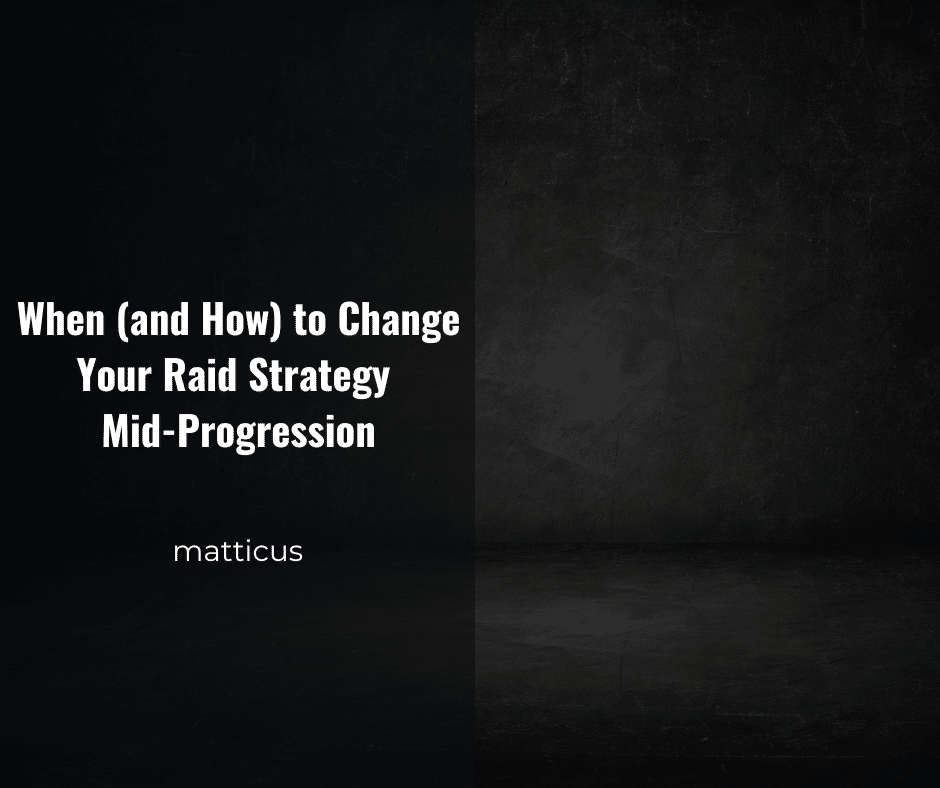I received a question during a recent trial interview.
“Hypothetically, if you wanted to grow the team and convert it into a top 10 two-night guild, what are some of the steps you would take? What does that road map look like?”
It’s a great question, and it caught me a little off guard. But here’s my honest answer:
If I really wanted to push this team into a top-10 two-night team, it would require commitment across the board. Not just from the players, but from me as the raid leader as well.
Here’s what that roadmap might actually look like.
Define the Goal with Precision
We’re not just saying “get better” or “rank higher.”
A top 10 two-night guild is already achieving Cutting Edge. They’re likely killing the final boss around top 150–200 worldwide. On a limited schedule, that’s a tall order.
This means defining success like:
- CE within the first 6–8 weeks of a tier
- No more than 1 sub-2% wipe per boss
- Kill bosses within 50–70 pulls, not 120+
- Finish ahead of reset-based nerfs
It’s an intense pace which brings me to the next point.
Raise the Floor, Not Just the Ceiling
You can’t build an elite team on the backs of just your best players. You do it by raising the minimum performance bar across the board. That means:
- Execution mistakes are rare, not routine
- Players are expected to own mechanics independently
- Logs are reviewed weekly for accountability
- Players can’t afford to fall behind on progression systems, M+ gearing, or knowledge
Every player has to be operating at or near the same wavelength. That’s hard to achieve if only a few are pulling the team forward.
Optimize the Roster
You need a roster of players who:
- Are consistent, hungry, and coachable
- Don’t need their hands held on every mechanic (just the really critical ones)
- Can take constructive feedback and self-review
- Bring value beyond damage (interrupts, CDs, utility)
That means being ruthless with cuts. Players who aren’t improving or matching the pace can’t stay, no matter how nice they are or how long they’ve been on the team.
More Support at the Top
Right now, leadership is basically just me and one other person.
If I want to scale us up, I need more lieutenants — experienced players who can:
- Take ownership of healing or tank assignments
- Do log reviews post-raid
- Help with group compositions (left/right group splits, interrupts, cooldowns, and raid planning)
But it’s not just about adding people — it’s about clearly defining their roles. I can’t just say “I need help,” I need to say what I need help with and what authority they’ll have.
Build Systems, Not Just Raid Plans
At the top end, strategy alone doesn’t win bosses — systems do:
- A repeatable planning template for each encounter
- Pre-assigned cooldowns, debuffs, interrupts
- Well-structured review and feedback loops
- Roster depth to rotate people in without missing a beat
Most teams plan the fight.
The best teams plan the tier.
Time Management and Off-Night Investment
With only 6 hours of raid a week, everything around those hours matters more:
- M+ for gear catch-up and trinkets
- PTR testing or log analysis before a new fight
- Video review of what’s coming up (for their own class)
- Personal research or even custom WA tracking
This doesn’t mean mandatory off-nights — but if 5–6 people are doing nothing outside of raid, we fall behind.
Final Thoughts
I’m not chasing top 10 two-night status right now — but if I were, these are the first things I’d do. Death Jesters is already one of the top two night teams in the world (and we mean actual two night, none of this overtime at the start of the tier crap).
A roster of skilled players will only take you so far. You need discipline, structure, and a team culture that prioritizes growth, learning, and personal responsibility. It’s a climb, not a leap. That means making tough calls and sacrifices along the way.
But the roadmap exists. It’s just a matter of deciding whether the destination is worth the cost.


